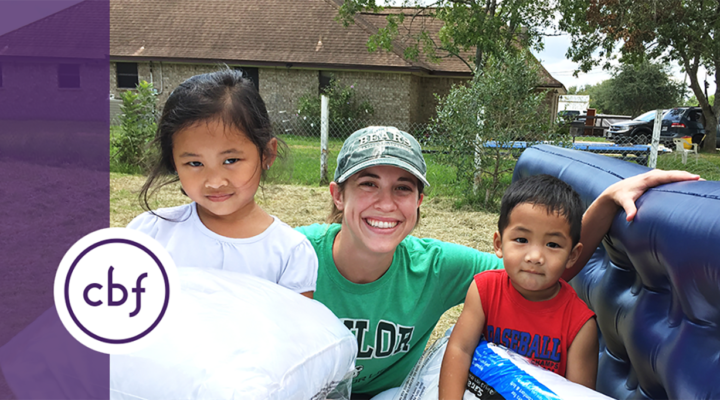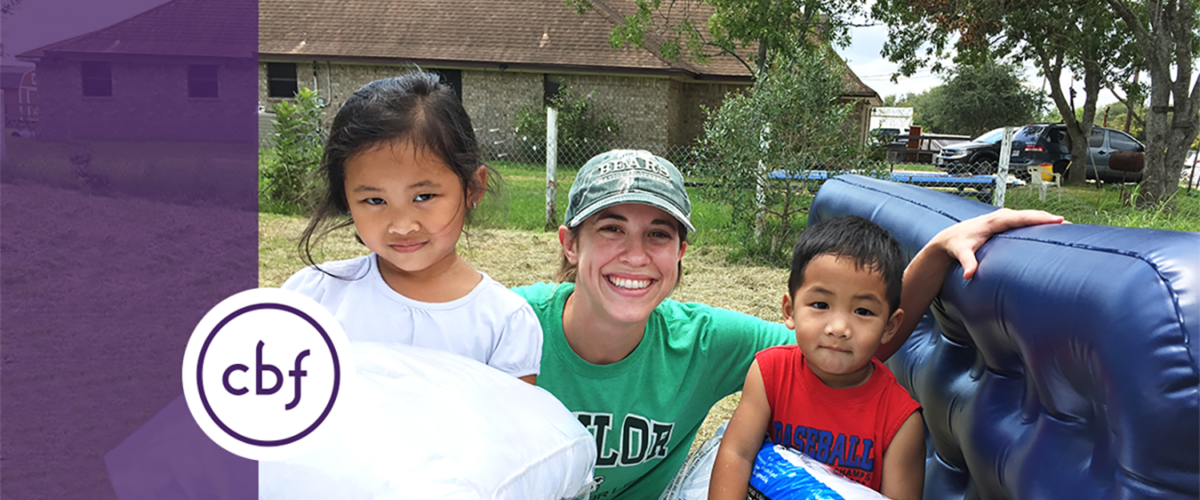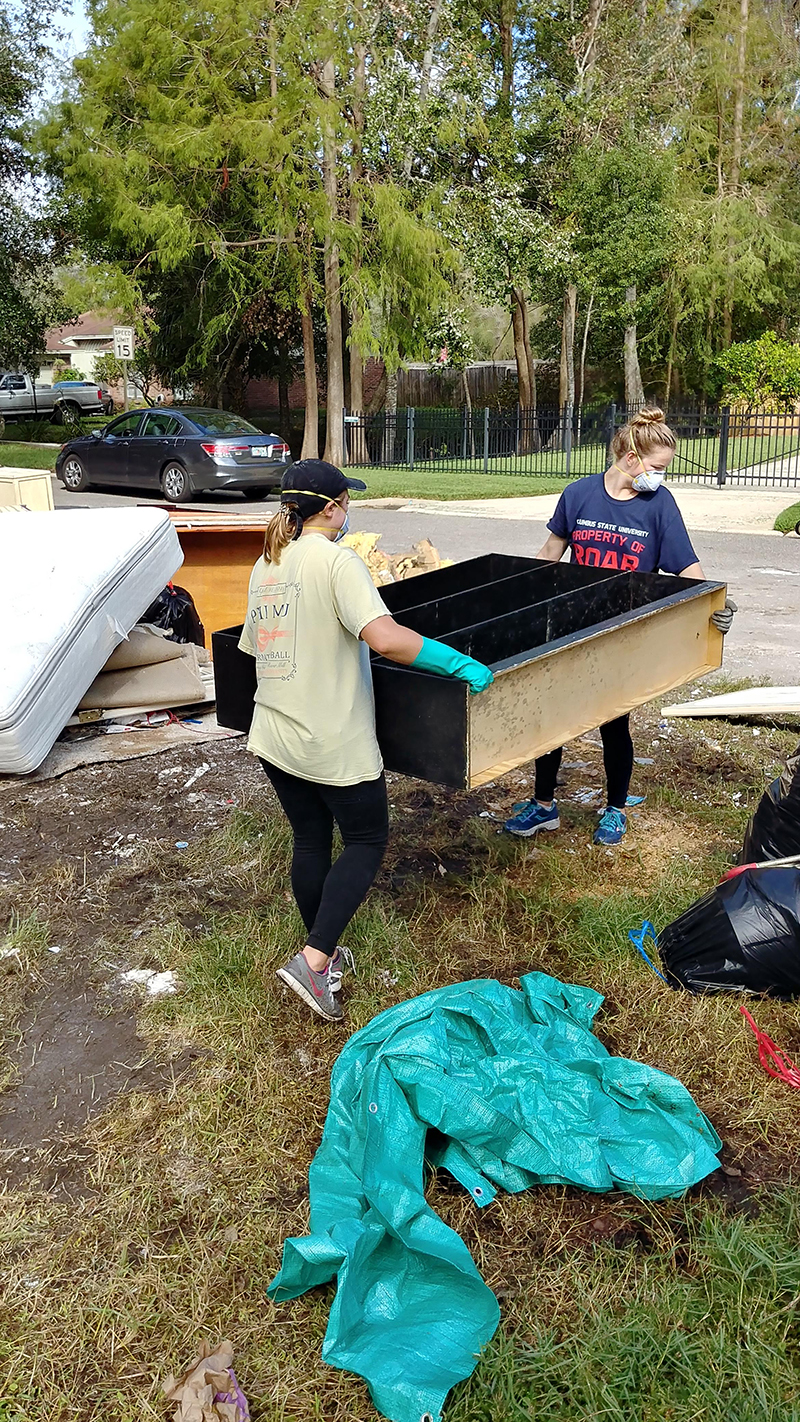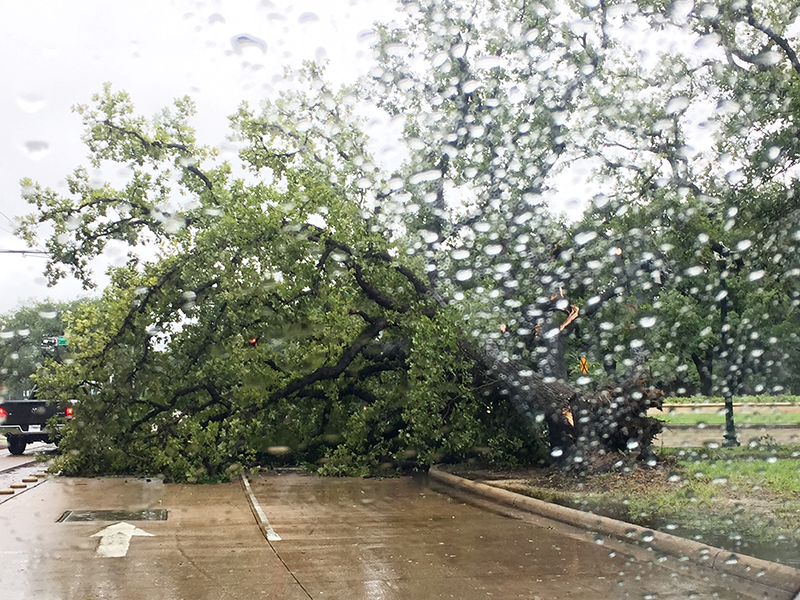By Jeff Huett
DECATUR, Ga. – It wasn’t until the early 1950s that tropical storms and hurricanes were given short, easily remembered names to cut down on confusion when multiple storms were churning at the same time.
In the late summer of 2017, hurricanes Harvey, Irma and Maria cut a wide path of destruction in the Caribbean and parts of Texas, Florida and Puerto Rico. God willing, it’s the love of Christ shown through the lives and actions of people with names like Butch and Nell, Jorge and Jesse, Kevin, Jesús, Juan and Randy — all partnering with the Cooperative Baptist Fellowship in hurricane-affected areas — that will be the indelible effect of the 2017 storms.
In keeping with CBF’s focus on long-term impact, CBF Disaster Response participates in networks seeking to help communities after a devastating event, but employs most of its resources on the long-term recovery, rehabilitation and resiliency of a community after
first responders have finished their work.
“Effective responses to disasters like we’ve seen are built on partnerships and networks of people and organizations doing what they do best,” said Alan Willliams, CBF’s disaster response coordinator. “CBF and its network of churches will be there for these communities long after others have left.”
In Houston and along the Texas Gulf Coast (Hurricane Harvey)
In Houston, after Hurricane Harvey, the names are Templo Bautista de Houston, Pleasant Hill Baptist Church (Houston), and CBF field personnel Butch and Nell Green. It’s Jorge Zapata of CBF Texas, Jesse Rincones of the Hispanic Baptist Convention in Texas and CBF field personnel Diann Berry who have led the work in rural counties far away from the city center, where wind damage (and not flooding), caused much damage to homes, churches and infrastructure. It’s schools like Baylor University and Baptist University of the Americas that have sent students to the area to do what they can.
Further partnerships have been announced among Texas Baptists to help design and rebuild churches damaged or destroyed in the storm. Visit www.cbf.net/gulfcoast for more info.

A food fair sponsored by Cambodian Baptist Church of Houston turned into a disaster recovery event when more than 1,300 people showed up for Harvey relief.
The needs are great but the response of volunteers is slowing in rural areas such as Rosharon, Texas, where communities of Cambodian refugee farmers live, according to Fellowship Southwest field coordinator Marv Knox, who spoke with Butch Green recently. Local CBF congregations, platoons of volunteers from churches elsewhere and CBF personnel are helping homeowners whose insurance and FEMA support aren’t enough to stabilize them.

Kayla Mize, a volunteer from DaySpring Baptist Church in Waco, Texas, helps children prepare their new tent, air mattresses and pillows as shelter from their mold-infested home.
“I’m concerned, because [volunteer] groups are trailing off,” Green said. Knox wrote that three groups will arrive before Thanksgiving, but none are set for December. One team will work in January, and two each are scheduled for spring break and summer 2018.
In an online article for the CBFblog (www.cbf.net/blog), Knox told the story of the Greens’ work as CBF field personnel and how that work positioned them for great impact in the weeks and months after the storm.
“Building and maintaining relationships is a key component of disaster recovery. After a few weeks, when the reality of Harvey soaked in, people felt the burden. We sat with them, talking and praying.”
Reporting from Marv Knox
Across the past seven years, the Greens have helped resettle refugees, who have flooded into Houston faster than to any other U.S. city; worked with international students; sponsored interfaith dialogues with Muslims, who worship in about 100 mosques in the area; and combatted human trafficking, a major scourge in the region.
Their initial response to Hurricane Harvey mirrored their ongoing ministries.

Groups of volunteers have helped victims of Hurricane Harvey get back on their feet. Photos on pages 20-21 are courtesy of CBF field personnel Butch and Nell Green.
On Friday night, Aug. 25, Nell maintained ongoing text contact with a co-worker from Afghanistan whose family of six watched in horror as floodwaters rose to their second-floor apartment. Then they spoke on the phone with a friend, a former international student who earned her Ph.D. from the University of Houston and who was communicating with seven other international students who had crawled into an attic before climbing onto their roof and swimming to safety. Even later, they received a call from a partner in their trafficking ministry about a stranded client who seemed to be going into labor. Nell is a nurse and, just before the Greens headed into the storm, the young woman’s labor stopped.
“Those people all were affected in different ways, but they reflect three aspects of our ministry,” Butch recalls. “It’s all about the relationships. Those people contacted us because they trust us.”
Building and maintaining relationships is a key component of disaster recovery, he says. “We want to get (disaster recovery) work done. But relationships are 10 times more important. … After a few weeks, when the reality of Harvey soaked in, people felt the burden. We sat with them, talking and praying.”
And the Greens put feet to those prayers by facilitating CBF recovery efforts in and around Houston. Butch is hands-on, coordinating work sites. Nell keeps communication moving through social media.
For his part, Butch has found joy in his newfound on-demand ministry.
“It’s a blessing to see volunteers come and be what we’re supposed to be — the church helping people in need,” he explains. “We’re doing what CBF is all about — helping the marginalized, those who need help the most.
“We’re not huge, but we’re doing our best, and we’re here for the long haul.”

Children were able to return to school rather quickly after the storm and have some sense of normalcy while parents deal with the many physical issues of the flooding.
Knox reported that the Green’s recovery work is primarily in three areas:
• Rural Rosharon, home to the Cambodian refugee farmers.
• South Houston, where many of Houston’s Hispanic residents live and where Templo Bautista de Houston has been a hub of work.
• The Fifth Ward, an African-American community in the northeastern quadrant of the city, where Pleasant Hill Baptist Church and the Fifth Ward Community Redevelopment Corporation are providing energy and stability.
In Jacksonville and South Florida (Hurricane Irma)
In the Jacksonville, Fla.-area, after Hurricane Irma, the names are Island View Baptist Church and Hendricks Avenue Baptist Church and onsite volunteer coordinator Kevin Collison, who is pastor at Island View. In South Florida, the names are Sweet Home Missionary Baptist Church in Miami and Christ Journey Church in Coral Gables who are providing support for volunteer groups there.
Island View Baptist and Hendricks Avenue Baptist are the locations of staging sites after the Jacksonville area suffered a record-setting storm surge. Sweet Home Missionary Baptist Church and Christ’s Journey are doing the same in the south part of the state.
Ray Johnson, coordinator of CBF of Florida, said partner churches in Florida have inspired him in the way that they have cared for their people and their neighbors.
“I can’t remember a disaster in Florida that has impacted the state from one coast to the other and from the Keys to Jacksonville,” Johnson said. “Irma stretched our resources but not our resolve nor our response. It’s encouraging to hear from so many followers of Christ who are putting hands and feet to their thoughts and prayers.”
In Puerto Rico (Hurricane Maria)
In Puerto Rico, after Hurricane Maria hit the U.S. territory, causing devastating flooding and destroying the island’s utility infrastructure, the names are Iglesia Bautista de Metrópolis, a CBF of Florida congregation in San Juan led by CBF Missions Council member Jesús García, as well as Randy Shepley and Juan García of First Baptist Church Newport News, Va. It’s Rachel Gunter Shapard of CBF of Florida and CBF field personnel Eddy Ruble.
Iglesia Bautista de Metrópolis is serving as the Fellowship’s base of operations on the island, while First Baptist Church of Newport News, Va., is lending coordinating support stateside.
As it is doing in Florida and Texas, CBF is also working with the Federal Emergency Management Agency and the National Voluntary Organizations Active in Disasters (VOAD) in Puerto Rico.
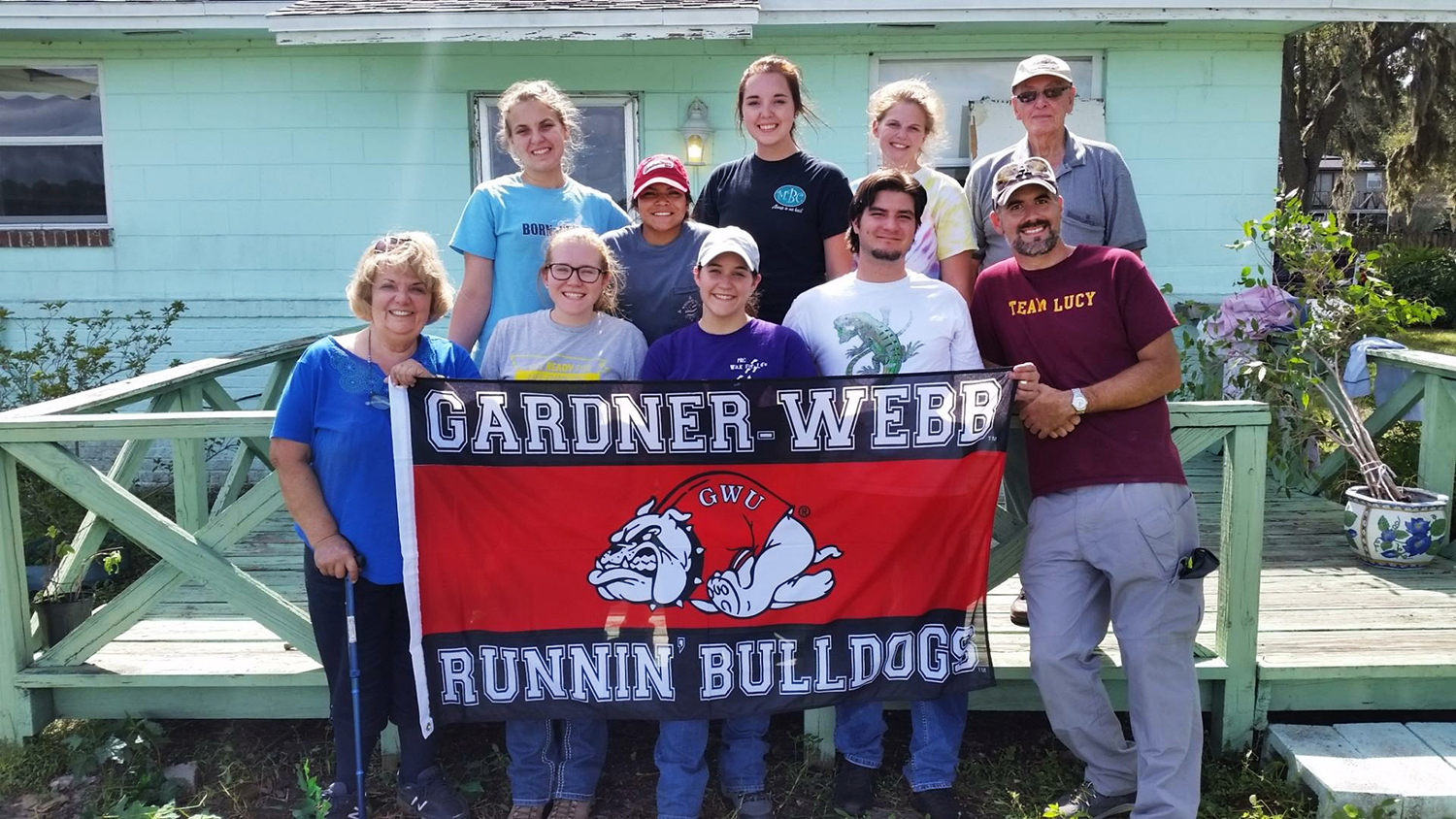
Students from schools such as Garner-Webb University volunteered their time and energy to help Harvey victims.
García said that he and his congregation have felt the cooperative spirit of CBF for years and appreciate the partnership with CBF in the midst of this storm.
“Being part of CBF has been a blessing,” García said. “Our church has experienced what cooperating really stands for. Every year, we have had different CBF missions groups that have come to Puerto Rico to partner and work alongside with us.
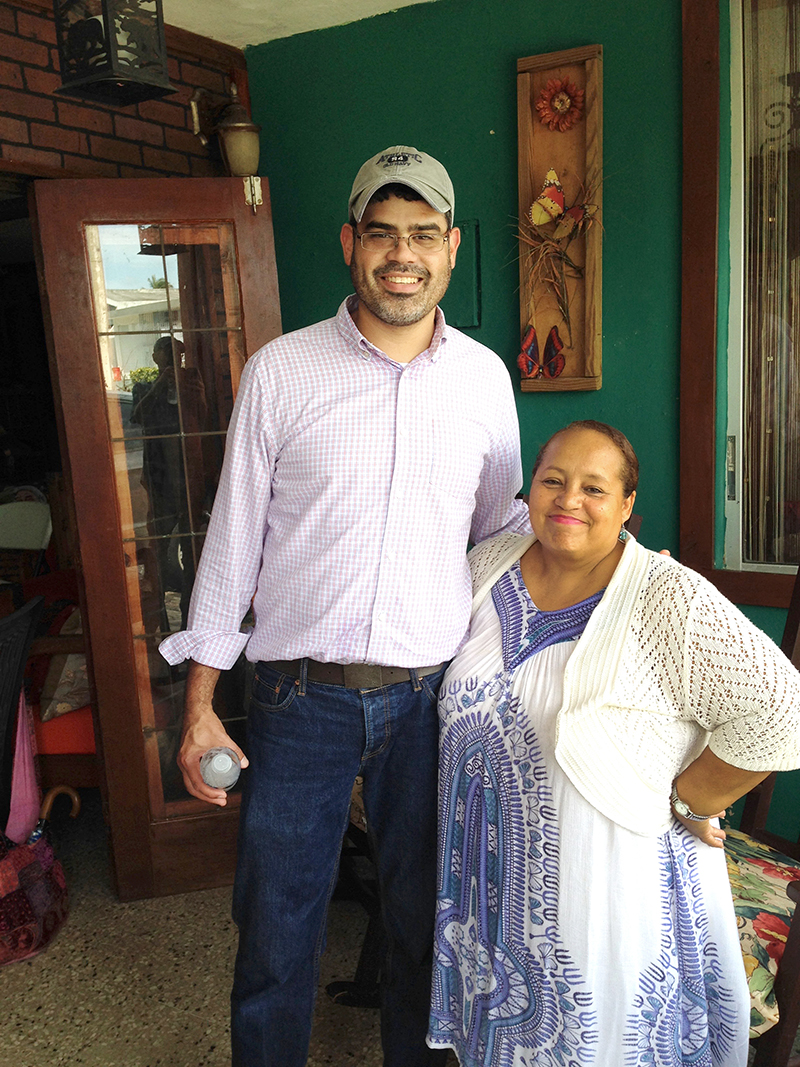
Juan García, an associate pastor at First Baptist Church in Newport News, Va., stands with a participant of a women’s prayer group from Iglesia Bautista de Metrópolis.
“Right now in the midst of Hurricane Maria we have felt the love of our CBF family. Puerto Rico is much stronger than a hurricane, and having CBF family walking with us will make this difficult journey much easier.”
Randy Shepley, who like García is a member of the CBF Missions Council and is pastor of First Baptist Newport News, said a trip to Puerto Rico five years ago was life-changing for him and has led to a powerful partnership between his congregation and Iglesia Bautista de Metrópolis.
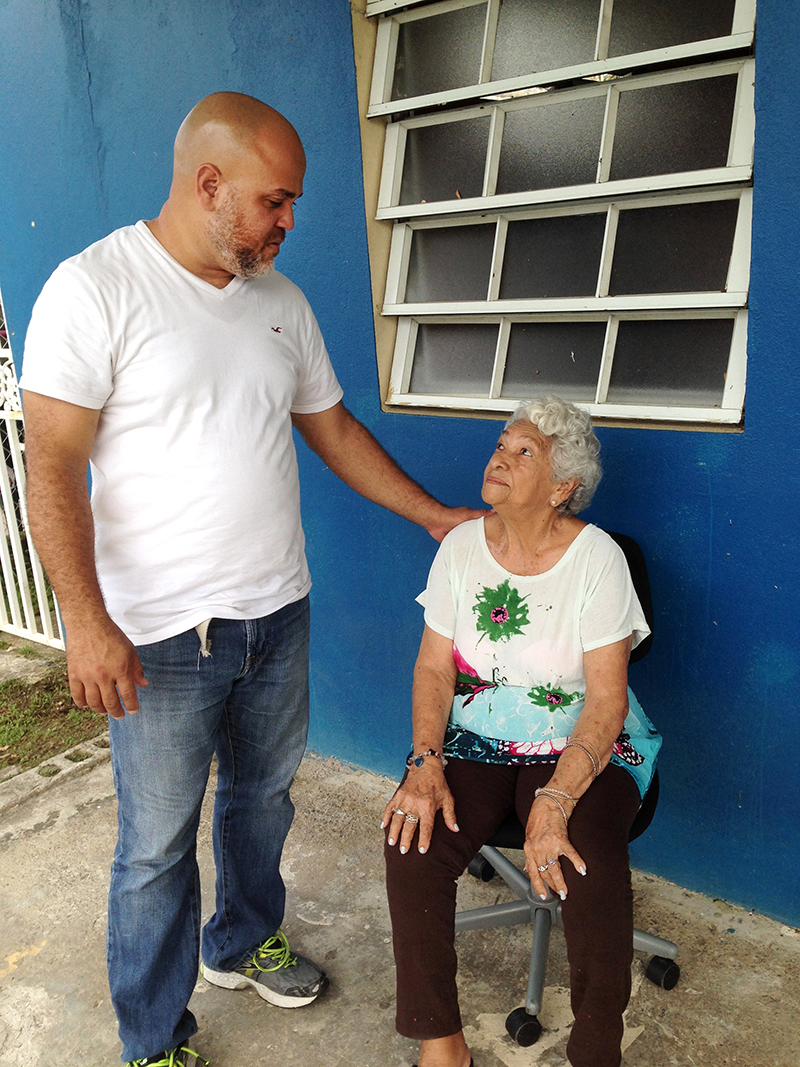
The mission pastor of a church in Levittown, Iglesia Bautista Cristo Restaura, a mission church of Iglesia Bautista de Metrópolis, stands with one of his congregation members on the porch of the home which had been flooded by 2 feet of water during the hurricane.
“The people of Iglesias Bautista Metrópolis understand authentic community in a way I have never seen,” Shepley said. “They worship, serve, love and build beloved community not only in their own congregation but among many congregations in Puerto Rico.
“Now, in the aftermath of Hurricane Maria and the devastation that has overwhelmed Puerto Rico, it is my prayer that the friendship of our two churches can serve as a catalyst for CBF individuals, churches and partner groups to bear witness to Jesus Christ by seeking transformational community development and renewal in Puerto Rico during these hard days.”
An October trip to Puerto Rico by CBF Disaster Response Coordinator Alan Williams as well as CBF of Florida associate coordinator Rachel Gunter Shapard, CBF field personnel Eddy Ruble and Juan Garcia found the U.S. territory mostly without power and often without running water. In the rural areas, structural damage and flooding are added on top of that. Visits by the group to San Juan and its suburbs, including local churches and a seminary on the island, have highlighted long-term partnership possibilities that could be developed and nurtured.
The group visited the Evangelical Seminary of Puerto Rico, which is supported by six religious denominations, including American Baptist Churches USA, the United Church of Christ, the Evangelical Lutheran Church in America, the United Methodist Church, the Presbyterian Church (U.S.A.) and the Christian Church (Disciples of Christ).
“Puerto Rico is much stronger than a hurricane, and having CBF family walking with us will make this difficult journey much easier.”
California Wildfires
CBF is also working alongside CBF field personnel Lita and Rick Sample and several CBF congregations in Northern California after wildfires broke out in the region in October. The fires burned more than 200,000 acres and forced more than 90,000 people from their homes. The fires also killed at least 43 people.
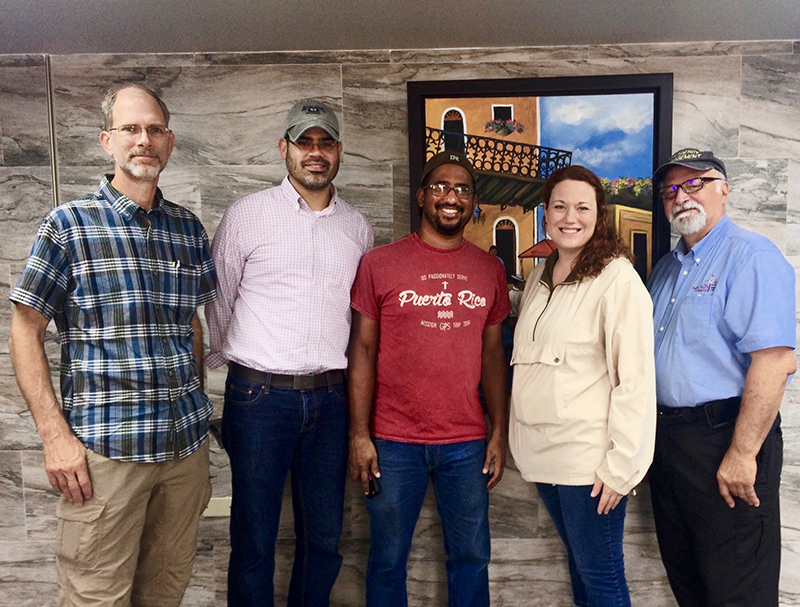
CBF’s assessment team: CBF field personnel Eddy Ruble; Juan García of First Baptist Church, Newport News, Va.; Jesús García of Iglesia Bautista de Metrópolis and CBF Missions Council member; Rachel Gunter Shapard of CBF Florida; and Alan Williams, CBF’s disaster response coordinator.
The Samples are working with Petaluma Valley Baptist Church, Crossroads Church and the Nineteenth Avenue Baptist Church to help coordinate ministry and reach out to fire victims in their community.
“Our main concerns are refugees and immigrants who were living in apartments and do not have insurance to replace their belongings or don’t have money to stay in a hotel,” Lita Sample said.
The Samples asked for prayer for those in the community of Santa Rosa and other communities affected by the wildfires.
“People are losing hope when they have lost everything,” Rick said.
How to Help
For more information or to register to volunteer to help in CBF’s response to hurricanes Harvey, Irma and Maria, visit CBF’s Disaster Response Volunteer page at www.cbf.net/dr-volunteer. There, volunteer opportunities in these areas are listed and you may submit information to volunteer for specific requests. Also, you may contact Anyra Cano, CBF’s Harvey-recovery coordinator at [email protected] for more information. Financial gifts to support CBF’s disaster response efforts may be made at www.cbf.net/dr-give.
Offer relief and long-term recovery for people who have lost everything. Give to CBF’s hurricane relief at www.cbf.net/dr. You’ll build relationships and share Christ’s love in times of crisis and need.

